For a Culture of Freedom
Introduction
In the chapter 'Change and Insight,' we embark on a profound journey that takes us through the depths of German history and simultaneously shows paths to the future. This journey requires us to recognize the need for a turning point in dealing with our collective past – a turning point that marks not an end, but a new beginning, born from the love of truth and freedom.
The contemplations in this chapter go far beyond the specific topic of German history. They focus on universal themes of self-discovery and change. As aptly stated in the text 'Change and Insight': We may not be able to change the entire world, but each of us can be a light of encouragement and change. Our willingness to change and self-awareness allows us to touch the hearts of others across borders and foster dialogue.
While memorials of the past and the culture of remembrance in Germany are important elements, they are not sufficient on their own. More than just admonishment and remembrance is needed; it requires an appreciation of life, hope, and above all, love - experiences that can be felt in one’s own life. The Friedensmal stands as a symbol of this paradigm shift, not only in relation to the past but also for today and tomorrow. It is a sign of hope and change, a blessing that can even extend beyond the borders of Germany, working for the universal message of peace and understanding.
This chapter also explores the significance of a 'Culture of Freedom' that emerges from the experiences of fascism and war and holds global relevance. It's about recognizing the responsibility for freedom as a viable answer for societies worldwide. We emphasize the need to free ourselves from ideological captivity and inner suffering to pave the way for global peace and universal freedom.
The
Paradigm Shift in the Culture of Remembrance
In 1998, during the debate about building a central memorial in Berlin for the murdered European Jews, I had the idea for this project. I believed that a culture of remembrance focused on memorials and war monuments also needs a positive approach that stands for new life. This is not only true for Germany but worldwide. Only then can we create an approach free of guilt, which often puts people on the defensive. Merely admonishing and remembering are not enough. In remembrance, there also needs to be life and hope. Above all, it requires the healing of deep wounds. It is only on this path to healing that integration can occur, so we can truly say that we have learned something from the past; that the past does not repeat itself in another guise.The Idea of the Friedensmal
The idea of the
Friedensmal symbolizes a change in dealing with the past, which is significant not only for Germany but for all nations that must confront difficult historical events. It is not a memorial for the past, but a Friedensmal for the present and future. Inspired by the words of the Jewish poet Nelly Sachs, 'But those of you who do not shake the dust off your longing. Those of you who stop where it turns into light,' it invites us to actively live this transformation.The Turning Point - Beyond Memorials and Final Strokes
We are not faced with this choice: either to cling desperately to the past or to draw a line under it, which would ultimately be self-deception. The third option is the
Turning Point. A culture of memorials that lacks hope for peace and life is more a part of the problem than a solution. Instead of pressure and finger-pointing, what is needed is deep reflection, a pause, and a break from the pressure to conform, which prevents people from being themselves, belittles them, and prescribes that they must be perfect beings, as defined by society at the moment. Beings without shadows, forming a perfect nation. We must learn to accept life in all its diversity – as symbolized by a Rainbow. This Turning Point means managing without new perfectionism or a totalitarian ideology of 'the new good' to avoid falling into the traps of the past again.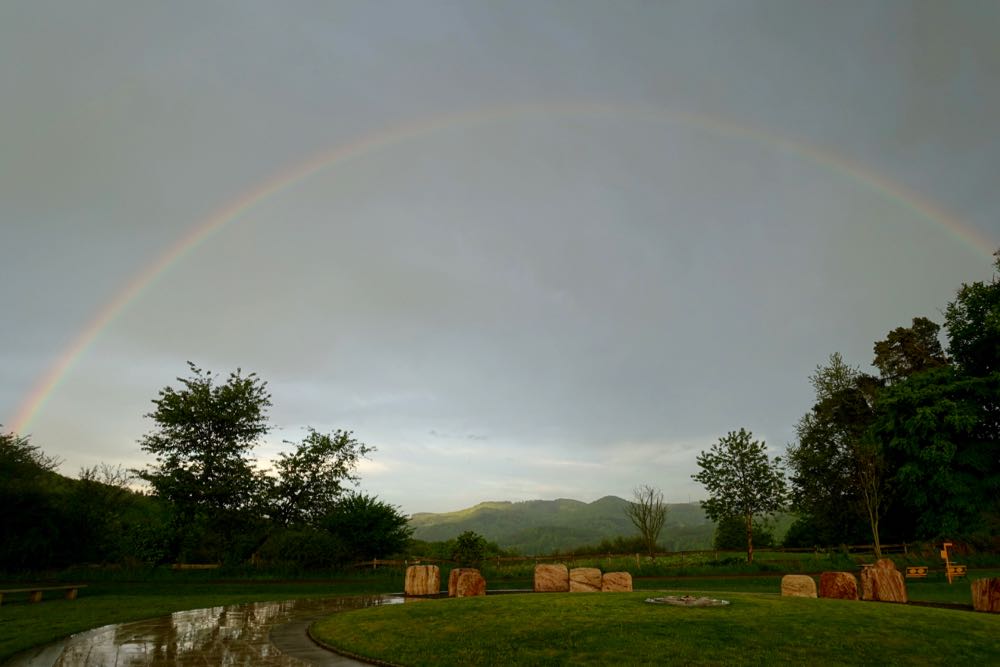
After the Turning Point Set by Rabbi Mendelson, a Great Rain Came, Followed by a Rainbow Toward Jerusalem (Film)
The Friedensmal as a Guidepost
The
For a Culture of Freedom: Lessons from History
This chapter builds on previous considerations by examining the significance of German history in the context of fascism and war and embedding these experiences into a broader, universal 'Culture of Freedom.' The experiences with fascism and war, which led to millions of deaths worldwide, are not just a part of German history but also a cautionary example for all humanity. It's about transforming these experiences in a way that leads to healing and freedom, rather than repeating themselves in new forms.
The Stone of Encounter at the entrance to the Friedensmal is inscribed with '...that we may recognize the fences in our togetherness.' These words remind us that recognizing and acknowledging different worldviews helps us overcome entrapment in narrow ideologies. 'Ideology' can be a fenced intellectual terrain, yet life extends far beyond it. In many parts of the world, not just in Germany, there have been severe experiences with the entrapment in ideologies. True freedom begins with the ability to think freely and dare to question any ideology. This requires courage to explore new ways of thinking and expression and to promote open exchange of opinions.
The causes of dark times, as found in the Third Reich, are not only in evil but also in more subtle dynamics of human nature. Why were so many people deceived and silenced instead of denouncing injustice when it was still possible? Today's culture of remembrance should not just be about conveying feelings of shame and guilt, but more about answering this question. The 'Garden of Freedom,' where the
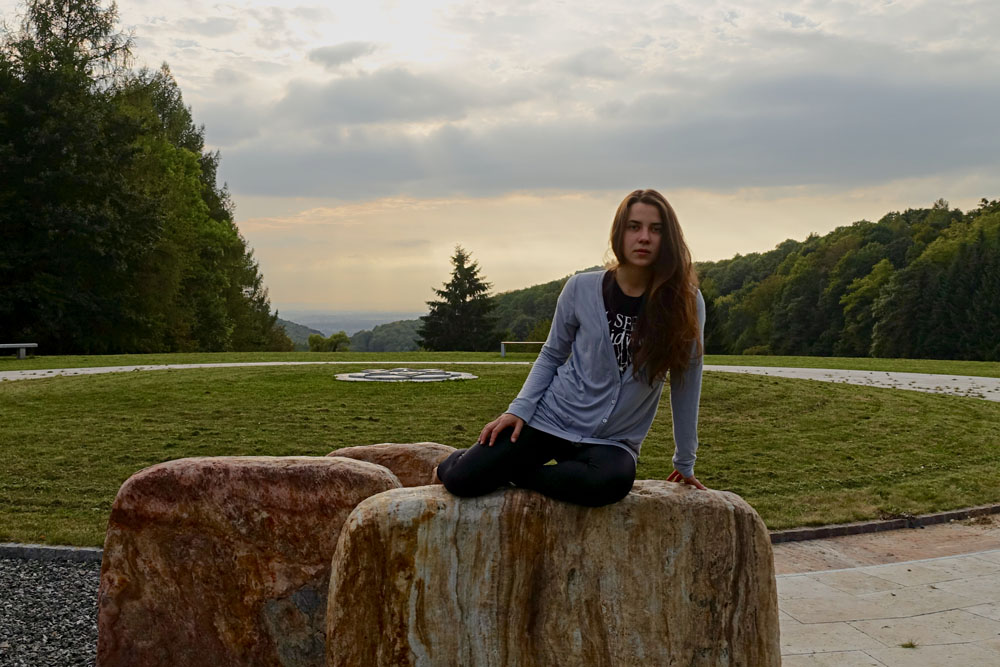
The Ukrainian Dancer Dances for Peace and Spiritual Awakening at the Friedensmal (video)
Overcoming Guilt and Enemy Images
People can be controlled with feelings like guilt, shame, and powerlessness. When the past is instrumentalized to control a society in this way, it prevents truly learning from the past. The true lesson from negative events should be positive, such as the development of an unconditional will for freedom. When 'learning from history' is associated with feelings of guilt, shame, or insignificance - for people who are personally not guilty - it shows that in reality, it was not primarily about real learning, but another political agenda.
The tendency of individuals, groups, or societies to focus on enemy images, such as 'the Zionists', 'the Palestinians', 'the digital-financial complex', or others, is a global phenomenon. However, these enemy images bind the power to become truly free. True freedom arises from within, a process that I have depicted in the Friedensmal. We live in a world of stories and projections – the external often reflects the internal. When one directs one's energy towards enemy images, it only gives them more significance in the real world. The tendency to seek simple explanations for complex dynamics often leads to misunderstandings and prevents a deeper understanding of reality.
Insights into consciousness and healing in dealing with the past are important for individuals and societies worldwide. They lead us to deeper reflection on how each individual's inner development can have positive effects on society. Individual awakening and responsibility for one's inner freedom are key to genuine peace and societal change. The Friedensmal symbolically represents a responsible and peaceful engagement with a burdensome past. It shows that societal lessons from the past can be learned through a culture of freedom and responsible citizenship, where the right to free expression is central. In this sense, the Friedensmal reminds us that the path to peace and freedom begins with each individual.
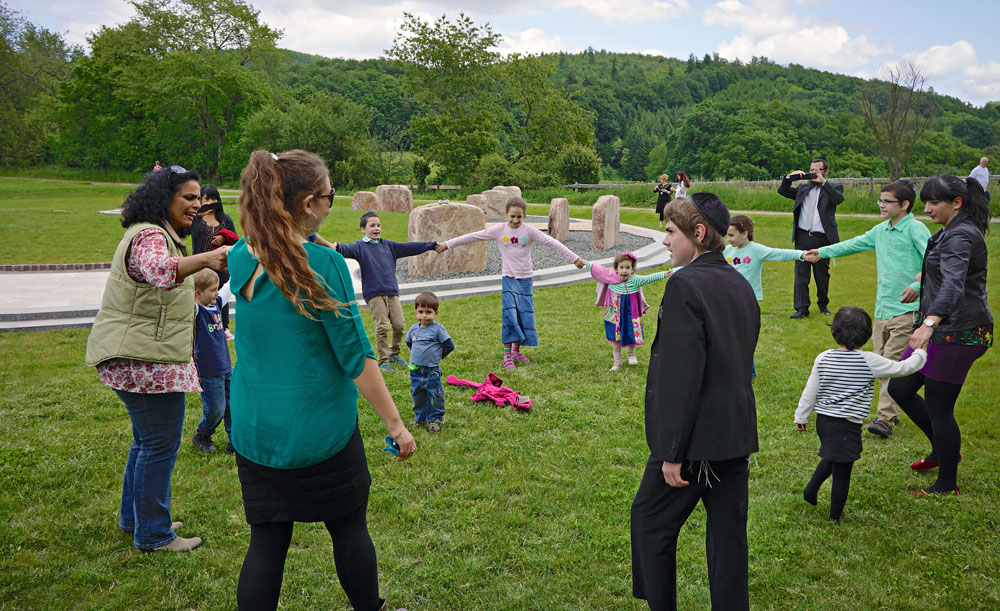
The Jewish Festival Lag baOmer at the Friedensmal
Turning Towards Life: Self-Realization and Liberation
This chapter is devoted to a deeper examination of self-awareness and liberation, emphasizing the importance of self-change and taking responsibility. The power to change oneself and thereby influence one’s own destiny is a universal truth. Attempts to change other people or entire nations from the outside are often doomed to fail; true change must come from within. The challenges arising from the dark chapters of history – whether in Germany or elsewhere – often have their roots in national or cultural characteristics. As long as these are not recognized and confronted, there is a risk that negative aspects of the past will repeat. Self-awareness means stepping out of the
prison of one's own self-deception - including one's own narcissism - and freeing oneself from illusions. This is the core of a true turning to life and liberation from feelings of guilt. The self-awareness embodied by the Friedensmal creates the conditions for a sustainable handling of contemporary challenges in Germany and beyond.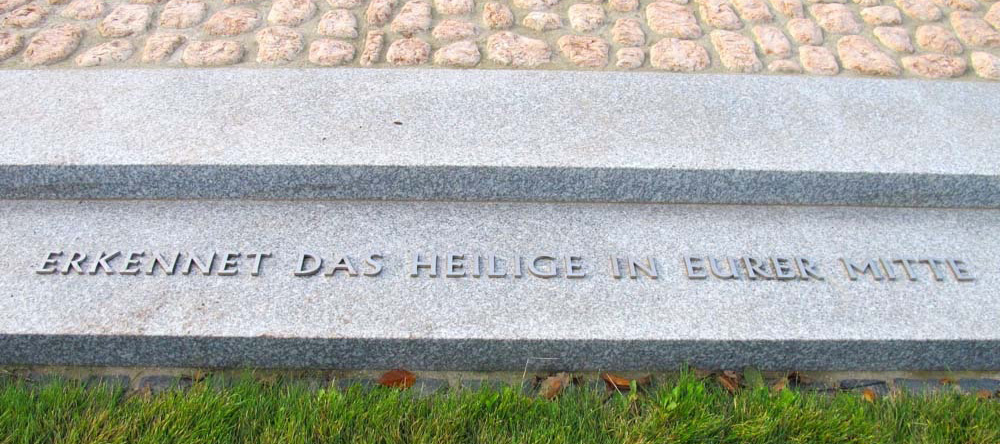
'Recognize the sacred in your midst' challenges us to search for the sacred within ourselves and not in external projections. The
A Place of Encouragement - In the Tree of Life
Changing other people is not possible. However, every individual can become an encouragement for others to turn towards life if they are able to touch their hearts through their being. The
Friedensmal is located in nature along a hiking trail. Here, one can take a piece of peace and inspiration back into the everyday world. In the face of the human experience of suffering in the world, the central element of the Friedensmal shows the Tree of Life as a path to inner peace. This symbolic representation reminds us that peace and healing must come from within.Visitors to the Friedensmal can experience a positive example of a culture of remembrance that looks not only to the past but also points the way to a dignified and free future. It is a place that shows that true dignity and freedom arise from the courage to face the past while simultaneously looking forward. In this sense, the Friedensmal is more than just a memorial site; it is a living symbol of the possibility of transformation and personal as well as collective growth.
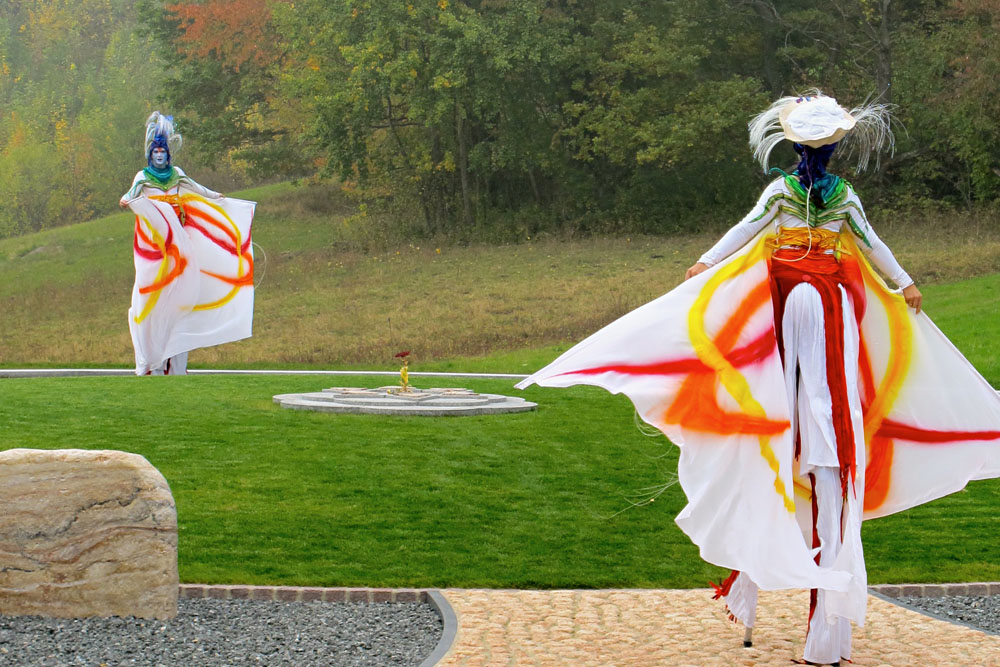
Dance of the Rainbow People at the Festival of the Inauguration of the "Stone of Encounter"
Closing Words
The insights from our journey through history and the possible hopeful future for humanity convey a central message that has significance far beyond the borders of Germany: The
Turning Point that the global community seeks lies in self-awareness and the willingness to change. Every nation has its dark, even black chapters of the past, but these should not be repeated, but rather transformed. The remembrance of our history worldwide should not entangle us in guilt and shame but inspire us to responsible action and genuine freedom. In a global culture of freedom, characterized by mutual respect and free thinking, we can collectively overcome the mistakes of the past.Self-change and self-awareness are essential to free oneself from ideological captivity and inner suffering. This is the path to peace and freedom that people all over the world aspire to. The Tree of Life in the Friedensmal reminds us that true encouragement and inspiration often come from a place of self-acceptance and inner peace. Each of us can be a light of encouragement and understanding by touching the hearts of others through our own being and empathy. A future in dignity and freedom is possible if we have the courage to transcend our past by allowing change within ourselves and a state of being whole in the sense of reconnecting to the life-giving source (Religio). This journey of self-awareness and compassion enables us to contribute to a world where mutual respect and understanding can flourish.
